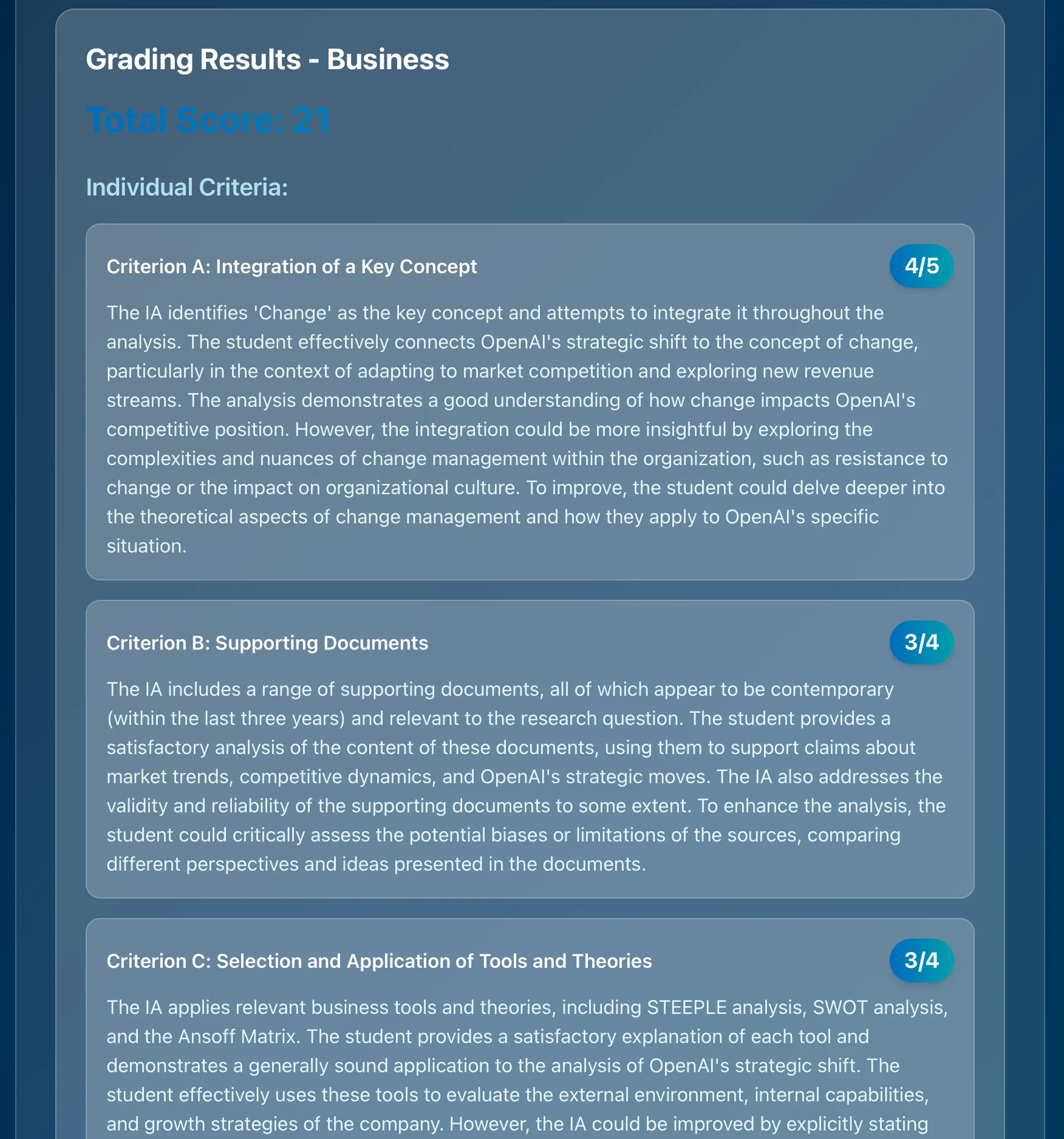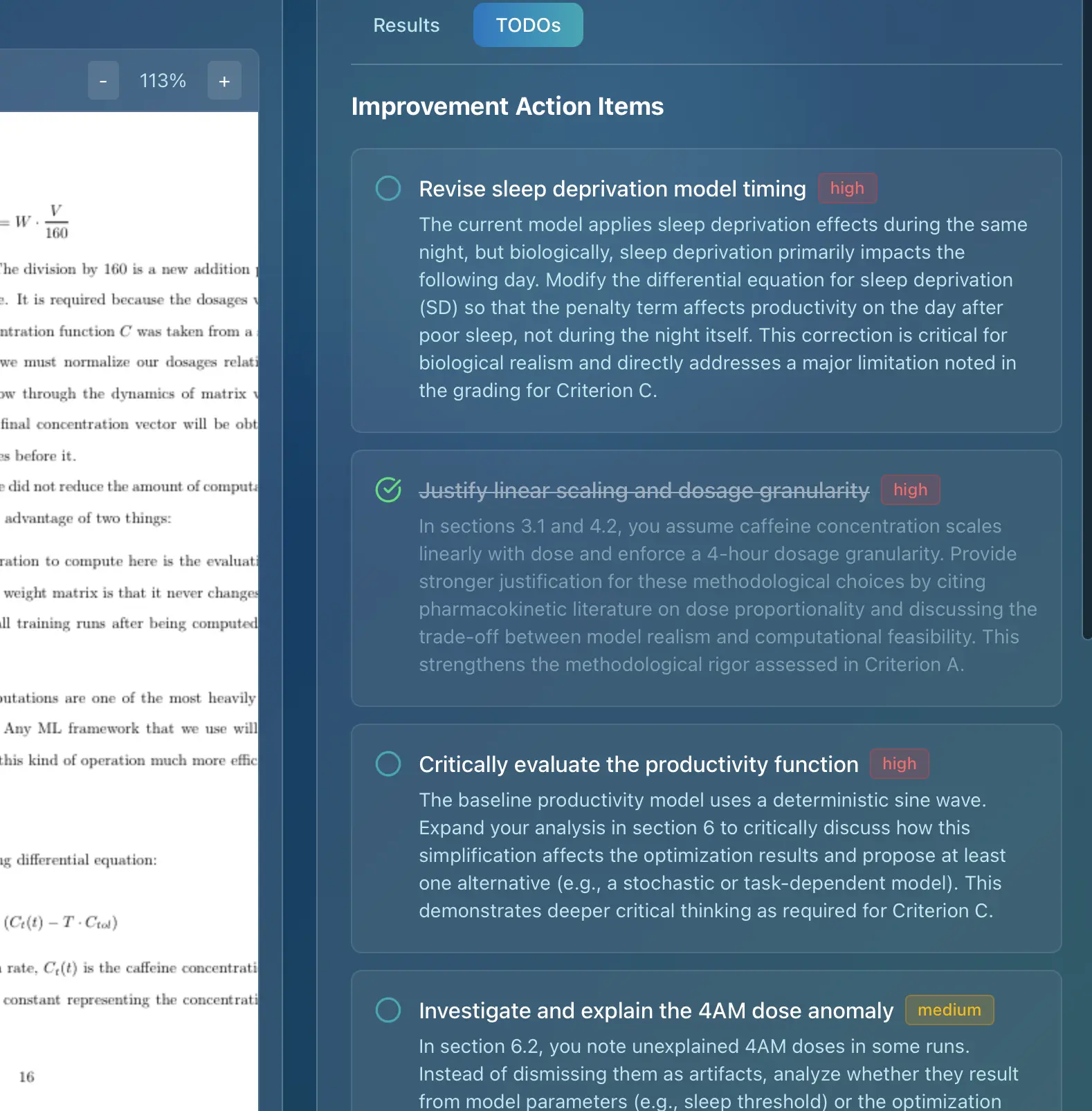IB Diploma Programme Structure: Everything Students Need to Know
Navigating the International Baccalaureate (IB) Diploma Programme can feel overwhelming. This comprehensive guide breaks down the IB structure, covering everything from core subjects and assessment components to the Extended Essay, Theory of Knowledge (TOK), and Creativity, Activity, Service (CAS). Whether you're an IB student, teacher, or parent, understanding the IB DP structure is crucial for success. We'll provide actionable advice, address common challenges, and even explore how AI is transforming IB assessment, helping you achieve your academic goals.
Understanding the IB Diploma Programme: A Comprehensive Overview
The IB Diploma Programme (IB DP) is a rigorous two-year pre-university course designed for students aged 16-19. It aims to develop well-rounded individuals who are knowledgeable, inquiring, caring, and internationally-minded. The program's structure is designed to provide both breadth and depth of study, encouraging critical thinking, intercultural understanding, and a commitment to lifelong learning.
The Six Subject Groups
At the heart of the IB DP are six subject groups. You'll choose one subject from each group, ensuring a broad and balanced education.
- Group 1: Studies in Language and Literature: Typically your native language.
- Group 2: Language Acquisition: A second language you're learning.
- Group 3: Individuals and Societies: Subjects like history, economics, psychology, and geography.
- Group 4: Sciences: Biology, chemistry, physics, environmental systems and societies, and computer science.
- Group 5: Mathematics: Offers different levels of math rigor, from Applications and Interpretation to Analysis and Approaches.
- Group 6: The Arts: Visual arts, music, theatre, and dance. Alternatively, you can choose a subject from groups 1-4 instead of an arts subject.
Standard Level (SL) vs. Higher Level (HL)
Within each subject group, you'll choose some subjects at Standard Level (SL) and others at Higher Level (HL). You must take at least three subjects at HL and no more than four. HL courses involve more in-depth study and require more class time.
- Standard Level (SL): Approximately 150 teaching hours.
- Higher Level (HL): Approximately 240 teaching hours.
Choosing the right balance of SL and HL subjects is crucial. Consider your strengths, interests, and future academic goals. For example, if you're planning to study engineering, HL Physics and Mathematics would be beneficial.
Struggling with IB Assessments?
Get instant, detailed feedback on your work with AI that understands IB criteria.

The IB Core: Extended Essay, Theory of Knowledge (TOK), and CAS
Beyond the six subject groups, the IB DP includes three core components: the Extended Essay (EE), Theory of Knowledge (TOK), and Creativity, Activity, Service (CAS). These components are designed to foster critical thinking, research skills, and personal development.
The Extended Essay (EE): A Deep Dive into Research
The Extended Essay is a 4,000-word independent research paper on a topic of your choice, related to one of your IB subjects. It's a significant undertaking that requires careful planning, research, and writing.
- Choosing a Topic: Select a topic that genuinely interests you and is manageable within the word limit.
- Research: Conduct thorough research using a variety of sources.
- Structure: Develop a clear and logical structure for your essay.
- Supervision: Work closely with your EE supervisor for guidance and feedback.
Example: A student interested in history might write an EE on the impact of a specific historical event on a particular region.
Theory of Knowledge (TOK): Questioning Knowledge Itself
Theory of Knowledge (TOK) is a unique course that explores the nature of knowledge and how we know what we know. It encourages you to critically examine different ways of knowing (e.g., perception, reason, emotion) and areas of knowledge (e.g., mathematics, science, history).
- Ways of Knowing: Explore the strengths and limitations of different ways of knowing.
- Areas of Knowledge: Analyze how knowledge is constructed and justified in different areas of knowledge.
- TOK Essay: Write a 1,600-word essay on a prescribed title.
- TOK Exhibition: Create an exhibition of three objects that explore a specific TOK prompt.
Example: A TOK discussion might explore the role of emotion in scientific discovery.
Creativity, Activity, Service (CAS): Experiential Learning
Creativity, Activity, Service (CAS) is a program that encourages you to engage in activities that promote personal growth and contribute to the community. It's designed to foster creativity, physical activity, and service to others.
- Creativity: Activities that involve creative thinking and expression.
- Activity: Physical activities that promote a healthy lifestyle.
- Service: Activities that address a genuine need in the community.
Example: A student might participate in a school play (creativity), join a sports team (activity), and volunteer at a local soup kitchen (service).
IB Assessment: Internal and External Assessments
IB assessment is a combination of internal and external assessments. Internal assessments are marked by your teachers, while external assessments are marked by IB examiners.
Internal Assessment (IA)
Internal Assessments (IAs) are subject-specific assignments that are marked by your teachers and then moderated by the IB. They are designed to assess your practical skills and understanding of the subject matter.
- Subject-Specific Requirements: Each subject has its own IA requirements.
- Teacher Guidance: Your teachers will provide guidance and feedback on your IA.
- Moderation: The IB moderates the IAs to ensure consistency and fairness.
Example: In Biology, the IA might involve designing and conducting a scientific experiment. In History, it might involve researching and writing a historical investigation.
External Assessment
External assessments are exams and written assignments that are marked by IB examiners. They are designed to assess your knowledge and understanding of the subject matter.
- Exams: Typically consist of multiple-choice questions, short-answer questions, and essay questions.
- Written Assignments: May include essays, reports, and other types of written work.
- Grading Rubrics: IB examiners use detailed grading rubrics to ensure consistency and fairness.
Example: The History exam might require you to analyze historical sources and write essays on specific historical events.
Common Challenges and Mistakes in the IB DP
Many students face similar challenges in the IB DP. Here are some common mistakes and how to avoid them:
- Procrastination: Start working on your EE, TOK essay, and IAs early.
- Poor Time Management: Develop a realistic study schedule and stick to it.
- Lack of Understanding of Assessment Criteria: Familiarize yourself with the IB assessment criteria for each subject.
- Not Seeking Help: Don't be afraid to ask your teachers, supervisors, or peers for help.
- Ignoring Feedback: Pay attention to the feedback you receive on your assignments and use it to improve your work.
Pro Tip: Get AI-Powered Grading
Stop second-guessing your grades. Get instant feedback aligned with official IB rubrics.

Advanced Tips and Strategies for IB Success
Here are some advanced tips and strategies to help you excel in the IB DP:
- Active Learning: Engage actively in class discussions and activities.
- Critical Thinking: Develop your critical thinking skills by questioning assumptions and evaluating evidence.
- Effective Note-Taking: Take clear and concise notes during lectures and readings.
- Practice Past Papers: Practice past papers to familiarize yourself with the exam format and question types.
- Seek Mentorship: Find a mentor who can provide guidance and support.
- Stay Organized: Keep track of deadlines and assignments using a planner or digital tool.
Technology and Modern Assessment in the IB
Technology is playing an increasingly important role in IB assessment. Online resources, digital tools, and AI-powered platforms are transforming the way students learn and teachers assess.
One of the most significant advancements is the use of AI grading assistants. Platforms like Marksy are revolutionizing the way teachers provide feedback on student work. Marksy uses official IB rubrics to provide instant, accurate, and detailed feedback on essays, IAs, and other assessments. This helps teachers save time and ensure consistent grading, while also providing students with clear and actionable feedback on how to improve their work.
Marksy's AI algorithms are trained on a vast dataset of IB assessments, ensuring that the feedback is aligned with the official IB criteria. The platform provides criterion-by-criterion feedback, highlighting strengths and weaknesses, and offering suggestions for improvement. This level of detail helps students understand exactly what they need to do to achieve higher scores.
The use of AI grading assistants like Marksy is not intended to replace teachers, but rather to augment their capabilities. By automating the tedious aspects of grading, AI allows teachers to focus on providing personalized instruction and support to their students.
Conclusion: Your Path to IB Success
The IB Diploma Programme is a challenging but rewarding experience. By understanding the IB structure, mastering the core components, and utilizing effective study strategies, you can achieve your academic goals. Remember to seek help when needed, stay organized, and embrace the opportunities for personal growth and development that the IB DP offers.
Ready to take your IB studies to the next level? Try Marksy for free today and experience the power of AI-powered feedback!